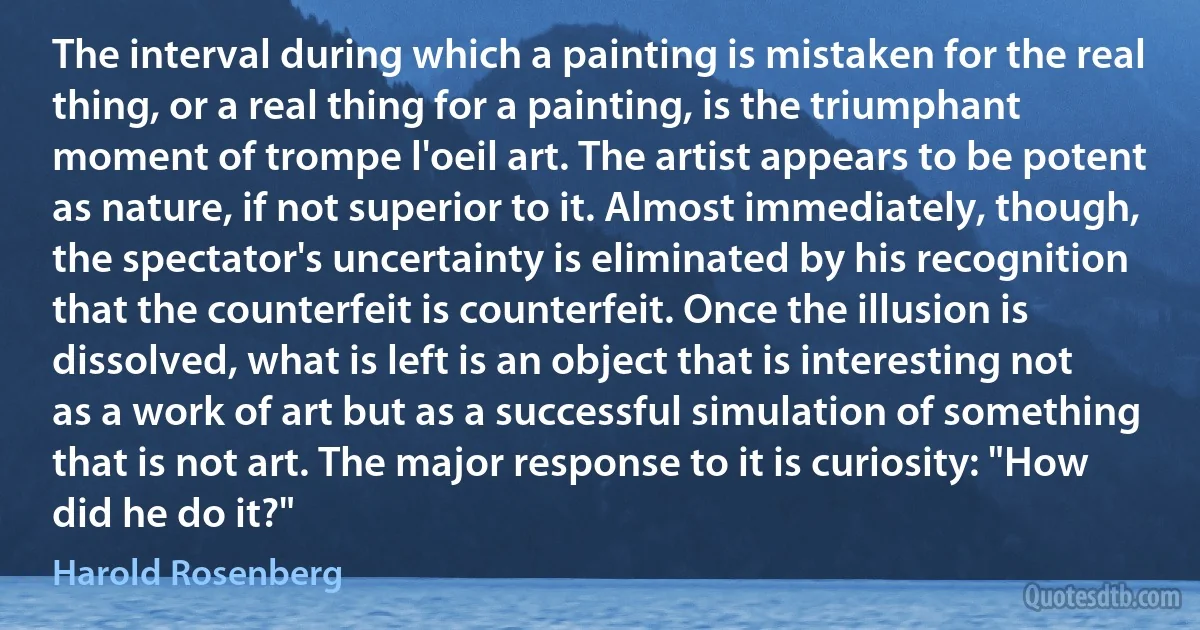
The interval during which a painting is mistaken for the real thing, or a real thing for a painting, is the triumphant moment of trompe l'oeil art. The artist appears to be potent as nature, if not superior to it. Almost immediately, though, the spectator's uncertainty is eliminated by his recognition that the counterfeit is counterfeit. Once the illusion is dissolved, what is left is an object that is interesting not as a work of art but as a successful simulation of something that is not art. The major response to it is curiosity: "How did he do it?"
Harold RosenbergRelated topics
almost art interval left mistake moment nature once real simulation something superior thing workRelated quotes
Whatever plane our consciousness may be acting in, both we and the things belonging to that plane are, for the time being, our only realities. As we rise in the scale of development we perceive that during the stages through which we have passed we mistook shadows for realities, and the upward progress of the Ego is a series of progressive awakenings, each advance bringing with it the idea that now, at last, we have reached "reality"; but only when we shall have reached the absolute Consciousness, and blended our own with it, shall we be free from the delusions produced by Maya [illusion].

Helena Petrovna Blavatsky
Then something unexpected happens. At least, I don't expect it because I don't think of District 12 as a place that cares about me. But a shift has occurred since I stepped up to take Prim's place, and now it seems I have become someone precious. At first one, then another, then almost every member of the crowd touches the three middle fingers of their left hand to their lips and holds it out to me. It is an old and rarely used gesture of our district, occasionally seen at funerals. It means thanks, it means admiration, it means good-bye to someone you love.

Suzanne Collins
A good many times I have been present at gatherings of people who, by the standards of the traditional culture, are thought highly educated and who have with considerable gusto been expressing their incredulity at the illiteracy of scientists. Once or twice I have been provoked and have asked the company how many of them could describe the Second Law of Thermodynamics. The response was cold: it was also negative. Yet I was asking something which is about the scientific equivalent of: Have you read a work of Shakespeare's?

C. P. Snow
Marcel Duchamp, one of this century's pioneers, moved his work through the retinal boundaries which had been established with Impressionism into a field where language, thought and vision act upon one another. There it changed form through a complex interplay of new mental and physical materials, heralding many of the technical, mental and visual details to be found in more recent art... He declared that he wanted to kill art ('for myself') but his persistent attempts to destroy frames of reference altered our thinking, established new units of thought, a "new thought for that object."

Jasper Johns
Women had to work like slaves in the art world, but a lot of men got to the top through their charm. And it hurt them. To be young and pretty didn't help a woman in the art world, because the social scene, and the buying scene, was in the hands of women – women who had money. They wanted male artists who would come alone and be their charming guests. Rothko could be very charming. It was a court. And the artist buffoons came to the court to entertain, to charm. Now it has changed, now the younger men are in – older women and younger men.

Louise Bourgeois
